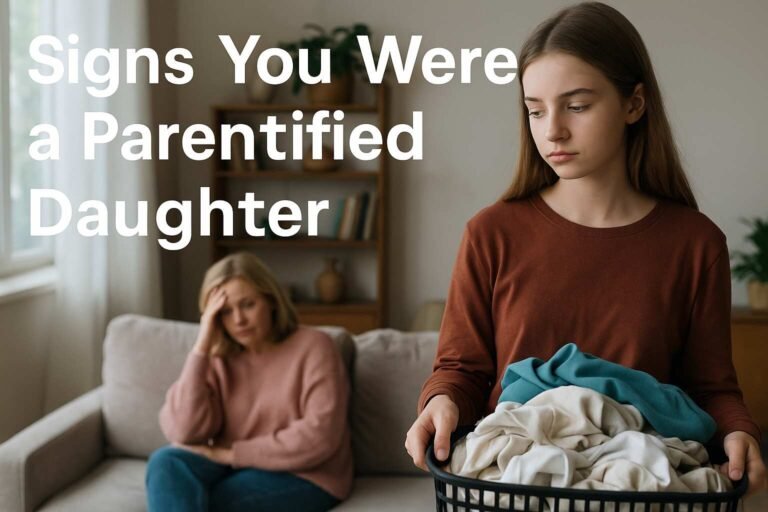
Journal Entry by Gloria – wife, mother, daughter – life coach for women
A Parentified Daughter?
You may not have heard the term before—“parentified daughter”—but if you’re reading this, something inside you probably already knows what it means.
The concept of parentification was first introduced by family systems theorist Salvador Minuchin in 1967. Psychologist Ivan Boszormenyi-Nagy further expanded and honed the concept in the early 1970s. He described it as a role reversal, where a child takes on caregiving responsibilities that are not age-appropriate—often to meet the unmet emotional or practical needs of a parent.
And while the theory may be decades old, many of us are just now realizing how deeply this silent role shaped our lives.
It’s a label for an experience many of us lived through before it had a name.
It describes the girl who became the helper, the listener, the organizer, the emotional anchor…
All before she had the chance to just be a child.
I know, because I was one.
My Story
When I was 8 years old, my parents divorced. That’s when something shifted.
I grew up faster than I should have.
I became the man of the house at my mother’s. Making decisions I shouldn’t.
I became the strong one, not just for her, but for my brothers and sister too.
I’m not sure she asked me to… but it felt natural to step in.
My mother is amazing, and she did a lot for us. But emotional presence and grounded care weren’t her strengths as we were growing up.
On the surface, it looked like she was holding it all together. But behind that smile, I felt her sadness. Her anxiety.
And something in me couldn’t look away.
Instead of homecooked meals around the table, we often ate in front of the TV.
Instead of structure, there was a lot of yeses, no boundaries, no anchors.
It wasn’t a lack of love. We had fun.
But as a growing child, I sensed something was out of balance.
And so I stepped in.
I did dishes, set the table, helped with the laundry, made sure my little siblings were okay.
I became what the house needed.
Not because I wanted to grow up, but because I felt I had no other choice.
What Happens When You’re That Girl
Here’s the thing: children are incredibly sensitive to what runs in the background.
We feel everything. The silence. The pressure. The absence of safety.
And even if no one says it out loud, we adapt to fill the space.
That’s what a parentified daughter does.
She steps in where the adults aren’t fully present.
I carried that into adulthood.
I was the one who held it together.
But deep down, I was starving for someone to hold me.
Signs You Were a Parentified Daughter
-
- You felt responsible for a parent’s emotional wellbeing
-
- You handled adult tasks like cooking, cleaning, caring for siblings
-
- You were called “so mature” too early
-
- You feel safest when you’re in control
-
- You carry chronic guilt for resting or receiving
-
- You feel emotionally exhausted from being “the strong one”
-
- You’re deeply sensitive to others’ needs—but not your own
-
- You’ve attracted relationships where you over-give and under-receive
-
- You still struggle to ask for help. It feels unsafe or unfamiliar
These aren’t flaws.
They are survival strategies you adopted too early.
They follow us into our adult lives, our marriages, our motherhood.
But once you see them, you can start to break free.
What I Had to Learn to Let Go
In my early adult years, I struggled to form real connections.
I was craving love, attention, care without even knowing how to ask for it.
I had no sense of healthy boundaries. I created situations of despair just so that I could be helped.
And that led to emotionally abusive relationships, toxic friends, and choices rooted in lack.
Until I met my husband—an actual grown, emotionally available man—who showed me what safety could feel like.
From there, everything began to shift.
When I started having children of my own, I made it my mission that they would never experience trauma or carry me in any way.
I did everything to protect them: handled it all, carried it all, even smothered them emotionally to shield them from hurt.
I was the strong one again!
But eventually, I realized:
You can’t protect your children from life.
You can only prepare them for it.
And trying to be a friend to my kids wasn’t the same as being a mother.
And when I began to align with a higher truth, I saw it all clearly:
There’s a divine order to things.
And role reversal isn’t part of it.
To become the mother I never had, I had to let go of the story I inherited.
I had to stop playing a part in someone else’s history and finally become me.
Now, As a Mother of Three Daughters…
I watch closely.
Especially my daughter who is so strong, so nurturing, so “good”, so happy.
I ask myself:
Is she helping because she loves to?
Or because she feels she has to? Is she compensating for something?
Because I know what that looks like.
I know what it feels like to carry love that’s tangled with duty.
So I choose every day to stay awake.
To show up in my role.
To mother with presence, structure, softness, and sovereignty.
Because I don’t want my daughters to inherit survival.
I want them to inherit safety. Wholeness. To leave behind a legacy.
I want them to be free to be who they are, not who the house needs them to be.
From Survival Role to Sacred Reclaiming
When a girl becomes the emotional root of a family, she grows up fast while feeling quietly fractured on the inside.
She learns that love must be earned. That silence keeps peace. That she must be “the responsible one,” the one to hold it all together, while silently longing to be held.
In my coaching work, I sit with women who carry these same stories. We don’t go there to blame. We go there to finally break free.
We don’t point fingers. We wake up to who we really are beneath the role.
You’re not here to carry the emotional labor of generations.
You’re here to live.
To love.
To be held too.
Coaching Tips for Healing the Parentified Daughter
In my work with women, I don’t focus on “fixing” you because you’re not broken.
But I do help you reparent yourself, rebuild safety, and release what never belonged to you.
Here’s how to begin:
1. Acknowledge the Truth Without Shame
“I was the child who had to grow up too soon.”
It’s not about blaming your parents (forgiveness is key here…); it’s about truth. And truth sets you free.
Naming your experience breaks the silence that kept you stuck.
2. Let Yourself Be Nurtured
Let others help you. Let yourself rest. Let someone make you a tea or carry the grocery bags without feeling guilt.
You are worthy of being cared for. Not just useful.
You are not a burden. You are worthy of rest and being held.
3. Release the Role of Fixer
You are not your mother’s therapist, your sibling’s savior, or your partner’s emotional crutch.
That job was never yours, even if you wore it well.
You are not here to manage others’ emotions. You get to be, not just do.
Stepping out of the fixer role is not abandonment. It’s liberation.
(NB: you can be caring without feeling the need to fix things)
4. Redefine Strength
Being “the strong one” isn’t real strength if it comes at the cost of your softness, which is the real strength of a woman.
Wholeness is the goal, not perfection. Wholeness includes tears, tenderness, and boundaries.
5. Reparent Yourself with Love and Compassion
Speak to your inner child daily.
She deserves joy, rest, and unconditional presence.
You are the mother she’s been waiting for.
You are both the daughter and the mother now. You get to start again, this time with love.
Final Words
True healing happens when you return to your divine identity, not the role you were forced to play.
When you rest in that truth, everything changes.
You’re Not That Little Girl Anymore.
You are not broken.
You are not too much.
You are not here to earn your place by doing for everyone else.
You are not just a parentified daughter.
You are a woman becoming whole.
And that wholeness will echo through everything you touch.
Let’s Keep the Growth Going
You’ve come this far for a reason. Stay connected and receive insights that meet you where you are—right in your inbox.
- Join our Newsletter -
Share:




